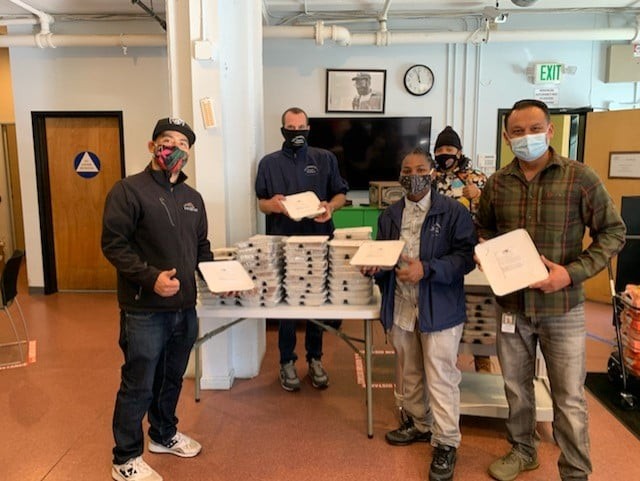San Francisco, CA. During COVID-19 restrictions the nonprofit serving veterans, Swords to Plowshares, had to adjust several group-oriented services, especially permanent housing. Development and Communications Director Colleen Corliss stated that Swords to Plowshares faced a “huge challenge” in making sure veterans received the benefits they needed while adjusting to CDC guidelines. “We immediately had to cancel all of the congregate meals that we serve in our housing sites,” Corliss said, “and yet we still had to feed people which creates a lot more work and money to prepackage every meal for every person, for 500 vets.” This November, Swords to Plowshares and Prubechu served over 200 Thanksgiving meals to homeless veterans throughout the SF area (seen above).
Swords to Plowshares was first established in 1974 by a group of six veterans who were growing concerned that the Veterans Administration (VA) was not appropriately addressing the issues returning soldiers faced like Post-Traumatic Stress Disorder (PTSD) and other debilitating conditions.
There is evidence that the VA had turned away a Vietnam veteran with undiagnosed PTSD for decades when he attempted to reach out for help. Corliss added that veterans were often denied their full benefits only because they had a less-than-honorable discharge from their military service.
“This is pretty commonplace with the Vietnam generation because they were withdrawing troops so quickly,” Corliss said, “certainly black veterans were disproportionately affected.”
The lackluster economy of the 70s, minimal benefits handed by the VA, and the divisive cultural shift Americans had for Vietnam vets caused them to struggle even more in adjusting to a new life after the war.
Veterans needed support and validation that “the military service caused some trauma, and the Department of Defense caused some suffering,” Corliss said.
Swords to Plowshares started as a safe community for veterans before being officially recognized by the VA in 1976 as a nonprofit organization formally representing the benefit claims of veterans.
Swords to Plowshares then started to provide a range of services in the coming decades to veterans that include legal support, financial advice, and housing assistance.
A huge part of the nonprofit is its permanent supportive housing program which currently has around 400 units scattered around San Francisco and Oakland with a number of on-site services.
“Primarily, our [permanent housing] residents are seniors,” Corliss said, “all of them are formally homeless and all of them have one or more disabilities.”
As the 2020s began, the nonprofit would have to start making major adjustments to its services when the pandemic began to endanger the lives of millions of Americans.
Veterans and their families who are in the middle of transitioning to permanent housing are typically placed temporarily in hotels for a few days to a couple of weeks. However, due to the pandemic, they have been forced to stay in their hotel rooms for several months due to the slowed process of getting permanent housing.
Mental health services were another challenge as Swords to Plowshares had to cancel all group-oriented meetings which is a major part of supporting veterans with mental health issues.
Currently, Swords to Plowshares has figured out how to continue supporting veterans with “a ton of new food partners, building up our emergency housing program out of nothing, and making those folks in hotels are getting on-site case management.”
Despite Swords to Plowshares’s successes in making the necessary changes to function in the pandemic, mental health for veterans continues to be an issue due to the current limitations on group meetings.
“It’s been sort of a creativity game of what can we do to make sure that people aren’t isolated and actually engaged in the community without actually violating any of the public health placed orders,” Corliss said.
One of the major goals of Swords to Plowshares in the coming years is to find an “in-between” with normal senior living facilities and their permanent supportive housing units for veterans. Several veterans are unfit for traditional senior living facilities due to substance abuse issues, mental health needs, and other problems that require special assistance.
“In the city, there’s no such thing as a boarding care facility anymore because of greed, they’re no longer profitable,” Corliss stated, “that’s our biggest priority right now because three-quarters of our residents are seniors.”
If you would like to help Swords to Plowshares to continue providing veterans with all of its immense services, click here to donate.
From Swords to Plowshares:
We are a community-based not-for-profit 501(c)(3) organization. We are dedicated to supporting nearly 3,000 homeless, low-income and at-risk veterans in the Bay Area every year. We offer employment and job training, supportive housing programs, permanent housing placement, counseling and case management, and legal services.





